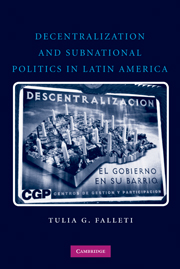Book contents
- Frontmatter
- Contents
- List of Tables
- List of Figures
- Acknowledgments
- List of Abbreviations
- 1 Decentralization and the Revival of Subnational Politics
- 2 A Sequential Theory of Decentralization and the Intergovernmental Balance of Power
- 3 Argentina
- 4 Colombia
- 5 Brazil
- 6 Mexico
- 7 Conclusion
- Bibliography
- Appendix: List of In-Depth Interviews
- Index
1 - Decentralization and the Revival of Subnational Politics
Published online by Cambridge University Press: 05 June 2012
- Frontmatter
- Contents
- List of Tables
- List of Figures
- Acknowledgments
- List of Abbreviations
- 1 Decentralization and the Revival of Subnational Politics
- 2 A Sequential Theory of Decentralization and the Intergovernmental Balance of Power
- 3 Argentina
- 4 Colombia
- 5 Brazil
- 6 Mexico
- 7 Conclusion
- Bibliography
- Appendix: List of In-Depth Interviews
- Index
Summary
Once administrative centralization has lasted for a while, the same power that founded it, were it later to want to destroy it, is always incapable of bringing about its ruin … [A]dministrative centralization assumes a skillful organization of authority; it forms a complicated machine of which all the gears engage each other and lend each other mutual support.
Alexis de TocquevilleIf Alexis de Tocqueville were alive today, he would be surprised to find that over the last quarter of the twentieth century, processes of decentralization of government – that is, the downward transfer of resources, responsibilities, or authority from national to subnational governments – have taken place in countries around the world (Manor 1999, vii). Part of a larger wave of economic and political reforms, the decentralization of governments followed the collapse of economic and political regimes with centralized commands and planning structures. Various world changes – the collapse of communism in the former Soviet Union and in Eastern Europe, the reforms to societal corporatism in Western Europe, and the demise of the developmental state in Latin America – all contributed to the search for new forms of articulation among the nation-states, their economies, and their societies. The decentralization of government policies that emphasized the principle of subsidiarity (of collecting, spending, and making public-policy decisions at the lowest possible level of government) proved functional to those larger political and economic changes.
- Type
- Chapter
- Information
- Publisher: Cambridge University PressPrint publication year: 2010
- 1
- Cited by



